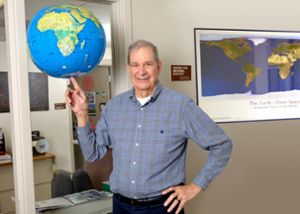James Tiedje elected Foreign Member of Chinese Academy of Sciences
James Tiedje, a Michigan State University Distinguished Professor Emeritus and internationally renowned microbial ecologist has been elected a Foreign Member of the Chinese Academy of Sciences for 2021.
The lifelong honor is among the highest that China awards to citizens of foreign countries, with only 25 Foreign Members elected annually. The 2021 Foreign Member cohort includes members from 11 countries, including the United States, United Kingdom, Germany, Israel, Brazil and France. New members are selected every two years.

Tiedje, who is the founding director of the Center for Microbial Ecology at MSU, is a leading expert in the fields of microbial ecology and metagenomics. His nominators cited his pioneering work, particularly in developing molecular and genomics tools to understand the impacts of anthropogenic activity on environmental microbiomes. He is also instrumental in promoting international collaboration in microbial ecology between China and the rest of the world.
“Microbes play huge roles on our planet — cycling nutrients, cleaning our water, changing our atmosphere, and contributing to our health — but some also cause disease,” said Tiedje, an emeritus professor in the Department of Microbiology and Molecular Genetics (MMG) in the College of Natural Science (NatSci) and the Department of Soil and Microbial Sciences in the College of Agriculture and Natural Resources. “Understanding and managing these microbial roles require global efforts, which I have done with scientists on all continents, including China. It’s a great honor that the Chinese have recognized the importance of this science and my research group’s contribution to it.”
Throughout his illustrious career that spans five decades, Tiedje has revolutionized microbial community analyses. His work in genomics has paved the way for a greater understanding of the structure and function of these communities. Additionally, his research has helped uncover the role of microbes in the biodegradation of environmental pollutants.
“With the Center for Microbial Ecology (CME), Jim Tiedje brought to MSU one of the earliest supported NSF Science and Technology Centers,” said Phil Duxbury, NatSci dean. “His vision of a multidisciplinary research center advancing knowledge in microbial ecology gave MSU national prominence in this field in 1989 and created the foundation for continued outstanding growth over the ensuing 30 years. The CME established a paradigm for leading-edge interdisciplinary science at MSU that continues today with the BEACON Center, the Plant Resilience Institute, Institute for Cyber-Enabled Research and many others. Jim is the consummate connector, bringing scientists together to accomplish things that they could not do alone, and his influence goes well beyond MSU to global partnerships, including important work in China.”
Tiedje has received numerous awards and recognition for his research and teaching. He served as president of both the American Society of Microbiology and the International Society for Microbial Ecology and was elected to the U.S. National Academy of Sciences in 2003. Tiedje was named a University Distinguished Professor at MSU in 1992 for his national and international achievements.
“Jim is a remarkable force in the field of microbial biology,” said Victor DiRita, Rudolph Hugh Endowed Chair in Microbial Pathogenesis and MMG department chair. “His leadership both as an investigator and as an intellectual with a broad vision of the power and importance of microbes and microbial processes is unparalleled. He has contributed much to our understanding of microbial communities, both in uncovering new knowledge about them, and in consistently driving new technologies to study them, technology that revolutionizes not only his work but the work of many others. It is fitting that Jim should be recognized with Fellowship in the Chinese Academy of Sciences for his sustained, singular contributions to microbial science.”
Tiedje, who received his bachelor’s degree from Iowa State University, and his master’s and doctoral degrees from Cornell University, joined the MSU faculty in 1968. He officially retired in 2019 but remains active in research.
Banner image: James Tiedje (third from left) with former Chinese (and one South Korean) scholars who worked with him at MSU. This photo was taken of the group while they were attending a symposium at Northwest Agriculture and Forestry University in Yangling, China, for a joint research project on the soil microbiome. Courtesy photo